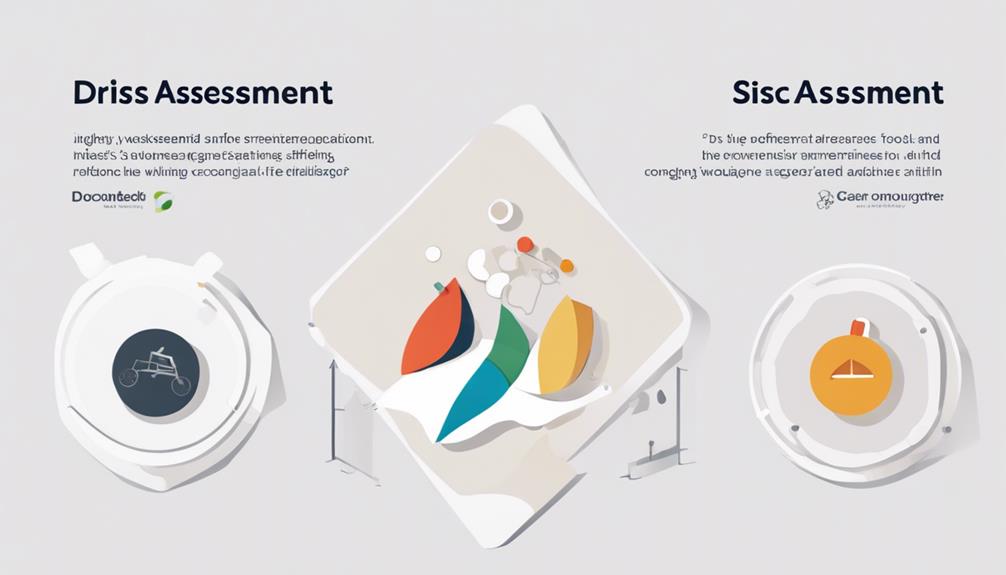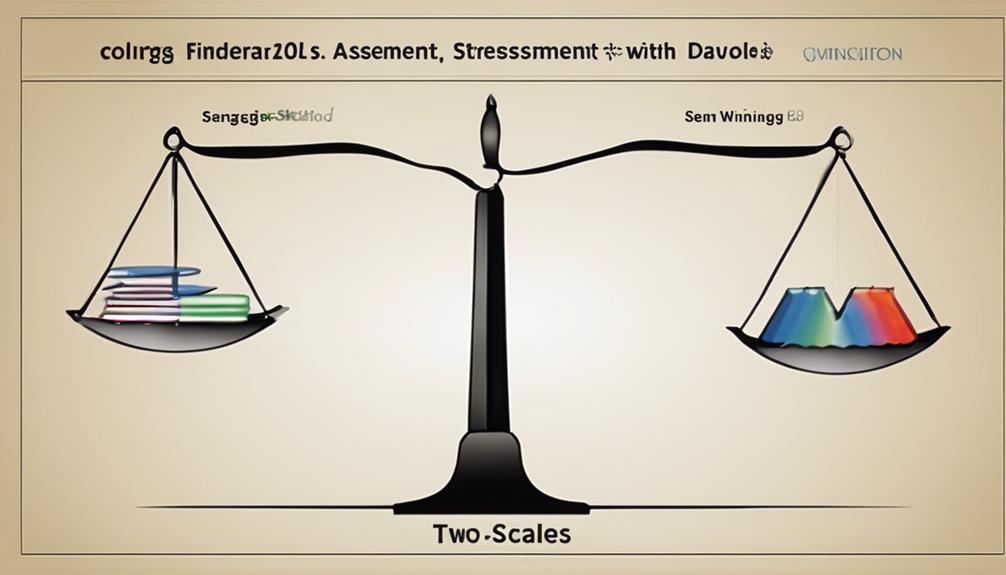Upon initial examination, some may wonder about the significance of contrasting the DISC Assessment with StrengthsFinder, assuming they have similar functions. Nevertheless, exploring the detailed intricacies of these two assessments unveils intriguing distinctions in their approaches to comprehending individuals.
By examining the methodologies, applications, and outcomes of both tools, we can uncover valuable insights into our own behaviors and talents. Let's explore how DISC and StrengthsFinder offer unique perspectives on personal and professional development, shedding light on the diverse ways we can enhance our effectiveness and success in various domains.
Key Takeaways
- DISC focuses on behavior traits, while StrengthsFinder identifies unique talents.
- StrengthsFinder enhances leadership and productivity through strengths alignment.
- Both assessments improve self-awareness and relationship dynamics.
- DiSC aids in understanding management styles, while StrengthsFinder aids in talent identification.
Development of DISC and StrengthsFinder
In the evolution of behavioral assessment tools, the DISC assessment emerged in the 1940s, crafted by Walter V. Clarke, with a focus on communication and behavior styles. Clarke's creation aimed to categorize individuals into Dominance, Influence, Steadiness, and Conscientiousness dimensions, providing insights into how different people interact and approach tasks. This development marked a significant step in understanding human behavior patterns and paved the way for further assessments to delve deeper into individual characteristics.
On the other hand, the StrengthsFinder, now CliftonStrengths, introduced by Don Clifton in 2001, shifted the spotlight towards unveiling individuals' unique talents. Clifton's innovative approach categorized individuals into 34 signature talent themes, emphasizing what individuals do best and how they can leverage their strengths for personal and professional growth. This shift from behavior styles to talent themes brought a fresh perspective to assessments, emphasizing the positive aspects of individuals rather than just their communication and behavior tendencies.
Both assessments have made a mark globally, with the DISC assessment being favored for its practical applications in team-building exercises and CliftonStrengths boasting a global reach with users from over 150 countries. The combination of understanding communication styles and unique talents has become instrumental in personal and professional development, shaping individuals and teams worldwide.
Administration and Purpose of Assessments

For a comprehensive understanding of the administration and purpose of the assessments, we delve into their distinct methodologies and intended outcomes.
- DiSC Assessment:
- Developed by Walter V. Clarke, the DiSC assessment focuses on understanding communication styles and enhancing conflict resolution skills.
- Designed to promote empathy within teams and improve overall communication effectiveness.
- Aims to provide individuals with insights into their behavioral tendencies to navigate interpersonal relationships more effectively.
- StrengthsFinder:
- Created by Don Clifton, StrengthsFinder aims to identify an individual's top strengths from a list of 34 talent themes.
- The assessment helps individuals leverage their unique strengths for personal and professional success.
- Focused on empowering individuals to maximize their potential by honing in on their core strengths and talents.
Both assessments serve as valuable tools for personal and professional development, with DiSC emphasizing behavioral understanding and communication, while StrengthsFinder concentrates on strengths-based growth and success strategies.
Accuracy and Mapping of Profiles
Transitioning from the discussion on administration and purpose, we now focus on the accuracy and mapping of profiles in the DiSC Assessment and StrengthsFinder, shedding light on how these assessments categorize individuals based on their behavioral tendencies and unique strengths.
The DiSC assessment categorizes individuals into Dominance, Influence, Steadiness, and Conscientiousness traits, focusing on behavior patterns. In contrast, StrengthsFinder pinpoints an individual's unique talents from 34 talent themes for precise profile alignment.
Both assessments offer in-depth insights into profiles, enhancing self-awareness and communication strategies. By mapping profiles accurately, these assessments enable individuals to understand their traits, preferences, and strengths, leading to improved interactions and performance.
Understanding how these assessments categorize individuals based on behavior and talent themes is crucial for developing effective self-awareness and relationship-building skills, fostering personal growth and success.
Self-Awareness and Relationship Building

Enhancing self-awareness and fostering effective relationship building are foundational aspects illuminated by the CliftonStrengths and DISC assessments through their distinct approaches to understanding individual strengths and communication styles. When individuals engage with these tools, they gain valuable insights that can significantly impact their personal and professional lives. Here's how these assessments contribute to self-awareness and relationship building:
- Identifying Strengths: The CliftonStrengths assessment delves into 34 unique talent themes, helping individuals recognize and leverage their strengths effectively.
- Understanding Personality: On the other hand, the DiSC assessment categorizes individuals into four primary personality types, offering insights into behavioral styles and communication preferences.
- Enhancing Communication in Teams: Both tools play a vital role in improving team dynamics by providing a nuanced understanding of individual strengths and communication styles, fostering better collaboration and productivity within teams.
Leadership, Productivity, and Recruitment
Building on the insights gained from self-awareness and relationship building, the focus now shifts towards examining how the StrengthsFinder and DISC assessments contribute to leadership development, productivity enhancement, and talent recruitment within organizations.
StrengthsFinder, by highlighting individual strengths, plays a pivotal role in cultivating effective leadership by allowing individuals to leverage their unique capabilities. It also aids in boosting productivity as employees are encouraged to focus on tasks that align with their strengths. Moreover, the assessment assists in talent identification, ensuring that recruitment efforts are targeted towards individuals whose strengths align with the required job roles.
On the other hand, the DISC assessment helps in understanding different management styles, enabling leaders to tailor their approach for high performance and successful team management. By enhancing employee engagement and aligning management styles with individual strengths, both assessments contribute significantly to organizational success and overall productivity.
Frequently Asked Questions
What Is the Difference Between DISC and Strengthsfinder?
In understanding the difference between DISC and StrengthsFinder, we recognize that DISC focuses on behavior and communication styles, while StrengthsFinder delves into unique strengths and talents, providing valuable insights for personal and professional development.
What Assessment Is Similar to Strengthsfinder?
We find CliftonStrengths similar to StrengthsFinder as both assessments unveil an individual's unique strengths from various talent themes, aiding in personal and professional growth. They assist in harnessing strengths for optimal performance.
Is the Disc Assessment Reliable and Valid?
Yes, the DiSC assessment is reliable and valid. Its extensive use and contextualization enhance its accuracy. Over 50 million individuals have benefitted from its insights since 1972, showcasing its credibility and impact on personal development.
What Is the Difference Between Strengthsfinder and Cliftonstrengths?
The difference between StrengthsFinder and CliftonStrengths lies in the evolution of the assessment's branding and focus. StrengthsFinder originated the concept, emphasizing top 5 strengths, while CliftonStrengths expanded to 34 unique talent themes, promoting strengths over weaknesses, now widely utilized.
How Does the Cleaver Disc Assessment Compare to Strengthsfinder in Terms of Analyzing Personal Strengths and Behavior?
The Cleaver DISC assessment uniqueness lies in its comprehensive analysis of behavior and communication styles. While Strengthsfinder focuses on personal strengths, the Cleaver DISC assessment delves into how individuals interact with others and their unique behavioral tendencies. It offers a holistic approach to understanding personal strengths and behavior.
Conclusion
In conclusion, the choice between the DISC Assessment and StrengthsFinder ultimately depends on the specific goals and outcomes desired. Like two sides of the same coin, these assessments offer valuable insights into individuals' behaviors and talents.
However, just as a compass guides us in different directions, each assessment serves a unique purpose in helping individuals navigate their personal and professional development journey. Choose wisely, as the right assessment can be the key to unlocking your true potential.









